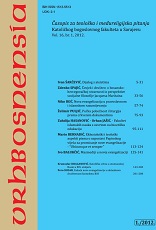Etičnost biomedicinskog istraživanja na djeci
Ethics of biomedical research with children
Author(s): Josip Grbac, Iva ŠtajduharSubject(s): Christian Theology and Religion
Published by: Katolički bogoslovni fakultet
Keywords: pediatric biomedical research; subjects of research procedure; pediatric informed consent; best interest standard; no-harm principle; ethical and legal regulation of pediatric research
Summary/Abstract: This essay explores some of the fundamental ethical issues and concepts that arise in research involving children. After introducing basic concepts and definitions, we reconsider the fact that children should not be viewed exclusively as objects of protection but as individuals who have rights, and as active participants in society. This is one of the basic ethical challenges in research involving children. The development of lifesaving treatment for lethal childhood diseases depends on advances in pediatric research, yet child-subjects can be at risk of harm even when intentions are good. Worse yet, children may be exploited or abused in the course of unethical studies. Often, children are both vulnerable subjects who need to be protected from potential research risks and “therapeutic orphans” who have been denied access to the benefits of research. In recent times some governments have promoted the inclusion of children in clinical research and have provided researchers and the pharmaceutical industry with new financial incentives, a move which has potential benefits and drawbacks. Despite years of debate and controversy, fundamental ethical questions about pediatric research persist. The twin goals of access and protection are not easily reconciled. Arguments for and against the participation of children in research are compelling, and the stakes are high. For decades, research policy protected children but failed to provide incentives for the conduct of pediatric research. Coupled with the disincentives associated with the additional protection required by regulation and the lack of a substantial market for pediatric drugs (relative to adults), children were categorically denied access to research and its benefits. Only in the last ten years has the pendulum begun to swing in the other direction. The development of a pediatric ethics that is based on genuine respect for children and their best interests requires that justification for pediatric research go beyond pure utilitarian motivation. Pediatric ethics is premised on this respect, even if it requires that such respect come at the expense of progress against childhood diseases. Individual benefit must take precedence over collective benefit, and the pediatric research community must remember that our responsibilities to individual children outweigh more speculative concerns regarding potential benefits to future generations of children. The balance must never tip in favor of science that benefits others over the best interests of the child-subject. Knowledge gained from research is part of our commitment to the benefit of our future but must be acquired in a way that recognizes the vulnerability of children and respects their inherent worth.
Journal: Vrhbosnensia
- Issue Year: 2012
- Issue No: 2
- Page Range: 405-429
- Page Count: 25
- Language: Croatian

